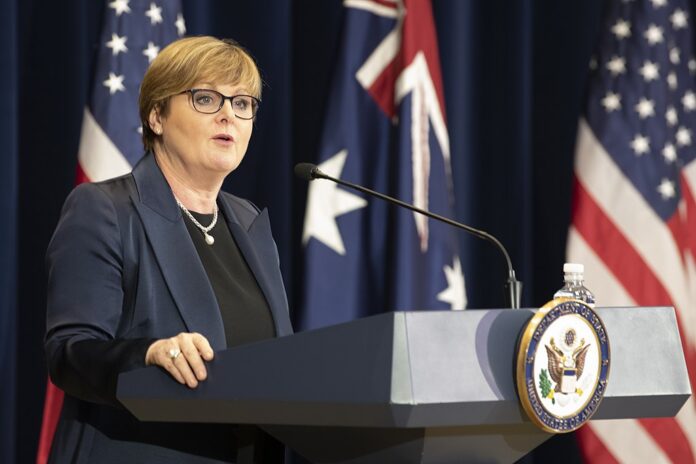In a perth defamation trial, Linda Reynolds partner reveals he only learned of Brittany Higgins rape allegations through media, not from Reynolds herself
In the ongoing defamation trial in Perth, Liberal Senator Linda Reynolds faces scrutiny over her handling of allegations made by Brittany Higgins. The trial has revealed that Reynolds’ partner, Robert Reid, discovered the allegations through media reports rather than directly from Reynolds. This disclosure has intensified the public and legal discourse surrounding the case.
During the seventh day of the trial, Reid testified about his shock and frustration upon learning of Higgins’ allegations. Reid, who had not been informed by Reynolds about the situation, expressed his surprise when he read about the case in the media. He described his reaction as one of “utter amazement” and questioned Reynolds about why she had not shared the details with him earlier.
Embed from Getty ImagesReynolds, who is suing Higgins for defamation, is accused of mishandling the allegations and engaging in a political cover-up. According to Reid, Reynolds had made a promise to Higgins to keep the details confidential, maintaining that it was not her place to publicly discuss the matter. Reid criticized this approach, suggesting that Reynolds should have addressed the accusations more openly to mitigate public and political pressure.
Reid’s testimony provided insight into the personal impact of the scandal on Reynolds. He recounted his efforts to advise Reynolds on how to handle the situation during parliamentary question time. Despite his suggestions, Reynolds maintained that she could not comment on the matter due to her commitment to confidentiality. Reid described his frustration with this stance, emphasizing that he felt it was inadequate given the gravity of the allegations and the growing media attention.
The allegations revolve around an incident in 2019, where Higgins claimed that Bruce Lehrmann raped her in Reynolds’ parliamentary office. Lehrmann has consistently denied the accusation, and his criminal trial was disrupted by juror misconduct. As the case continues, Higgins is scheduled to return from France to testify, adding further complexity to the legal and political ramifications of the allegations.
Reynolds’ approach to the scandal has sparked debate about transparency and accountability in handling serious allegations. Her insistence on confidentiality, coupled with the intense media scrutiny, has highlighted the challenges faced by public figures in managing such high-profile disputes.
Analysis:
Political Perspective:
The defamation trial against Linda Reynolds underscores the intricate relationship between personal conduct and political accountability. The handling of Brittany Higgins’ allegations touches on broader issues of political transparency and ethics. Reynolds’ approach, which involved maintaining confidentiality, has raised questions about the appropriate response to such serious allegations. This trial highlights the tensions between protecting individuals’ privacy and ensuring public accountability, especially for politicians involved in high-stakes controversies.
The trial’s outcome could have significant implications for political figures and their approach to managing allegations. It may influence how future cases of misconduct are handled, potentially setting new standards for transparency and accountability in political settings. The case also underscores the challenges faced by politicians in balancing personal and public interests, particularly when accusations have far-reaching implications.
Social Perspective:
The case reflects broader societal debates about the handling of sexual assault allegations and the importance of transparency. Public reaction to Reynolds’ approach indicates a growing demand for openness in addressing such allegations. The disclosure of sensitive information through media, rather than direct communication from those involved, highlights the evolving expectations for handling high-profile accusations.
The societal impact of the case extends to discussions about trust in public figures and institutions. The trial has sparked conversations about the responsibilities of politicians in addressing allegations of misconduct and the role of media in shaping public perceptions. It also raises questions about the broader implications for victims seeking justice and the public’s right to know about the handling of such serious claims.
Racial Perspective:
While the case does not directly address racial issues, the broader context of handling allegations of misconduct often intersects with discussions about race and systemic bias. The way allegations are managed and reported can reflect broader societal dynamics, including racial and ethnic considerations. In high-profile cases, the media’s portrayal and the public’s response can be influenced by racial factors, though this particular trial focuses primarily on the personal and political aspects of the allegations.
Gender Perspective:
The case highlights significant gender issues, particularly concerning the handling of sexual assault allegations. The scrutiny faced by Linda Reynolds and the public reaction to her approach reflect ongoing gender dynamics in addressing such claims. The trial emphasizes the challenges women face when coming forward with allegations of sexual misconduct and the complexities involved in managing these claims within a political and public framework.
The focus on Reynolds’ handling of the allegations also underscores the gendered nature of public scrutiny and accountability. The way gender plays into perceptions of credibility and responsibility in such cases can influence the outcomes and public reactions. The case serves as a reminder of the importance of addressing gender issues in discussions about transparency and accountability.
Economic Perspective:
While the case itself is not directly economic, the legal and reputational costs associated with high-profile defamation trials can have significant financial implications for those involved. The trial may affect Reynolds’ career prospects and public standing, potentially influencing her future political and professional opportunities. Additionally, the case could impact the broader political landscape, influencing public trust and perceptions of accountability, which can have indirect economic consequences for the political system and associated stakeholders.
